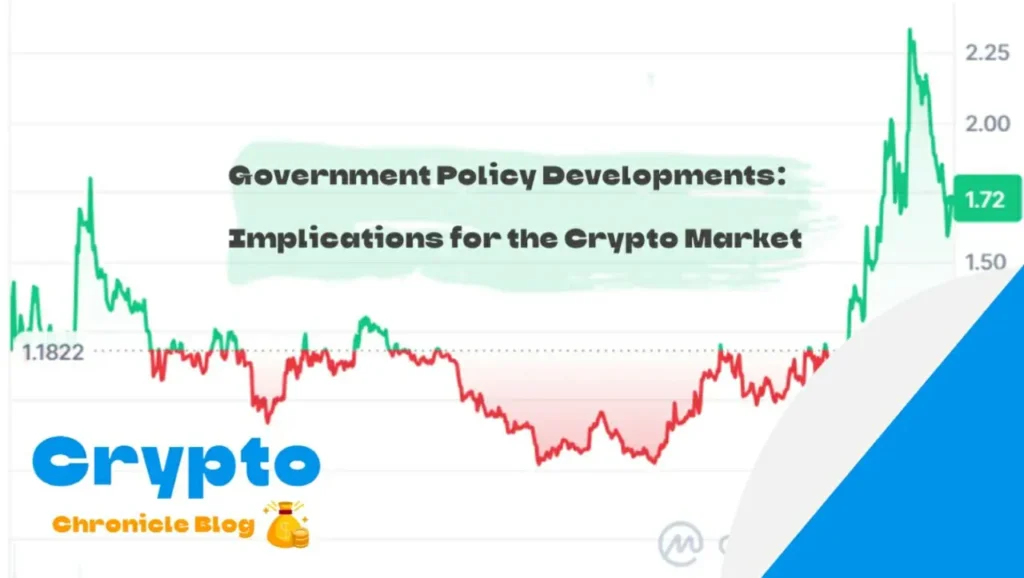Government Policy Developments: Implications for the Crypto Market
In recent years, the cryptocurrency market has experienced exponential growth, attracting the attention of governments and regulatory authorities worldwide. As governments grapple with how to regulate this emerging asset class, their policy decisions have significant implications for the crypto market as a whole.
Regulatory Landscape
The regulatory landscape surrounding cryptocurrencies varies greatly from country to country. Some governments have embraced cryptocurrencies, viewing them as a potential driver of economic growth and innovation. Others have taken a more cautious approach, citing concerns about consumer protection, money laundering, and financial stability.
Impact on Market Sentiment
Government policy developments often have a profound impact on market sentiment within the crypto community. Positive regulatory announcements, such as the approval of cryptocurrency exchange-traded funds (ETFs) or the recognition of Bitcoin as legal tender, can fuel optimism and drive prices higher. Conversely, negative regulatory actions, such as proposed bans or crackdowns on crypto exchanges, can lead to uncertainty and market volatility.
Compliance Challenges
Cryptocurrency businesses must navigate a complex web of regulatory requirements to ensure compliance with applicable laws and regulations. This includes measures such as know-your-customer (KYC) and anti-money laundering (AML) procedures, tax reporting obligations, and licensing requirements. Government policies that impose stringent regulatory burdens on crypto businesses can hinder innovation and growth within the industry.
Global Coordination
Given the global nature of the cryptocurrency market, regulatory developments in one jurisdiction often have ripple effects around the world. Governments are increasingly recognizing the need for international cooperation and coordination to address regulatory challenges posed by cryptocurrencies. Initiatives such as the Financial Action Task Force (FATF) guidelines aim to harmonize anti-money laundering standards across borders and mitigate the risks associated with crypto-related illicit activities.
Innovation and Investment
Government policies can have a significant impact on crypto-related innovation and investment within their jurisdictions. Regulatory clarity and a supportive legal framework can encourage entrepreneurs and investors to develop new blockchain-based applications and services. Conversely, overly restrictive regulations or uncertainty about the legal status of cryptocurrencies can stifle innovation and drive investment capital away from certain regions.
Future Outlook
The regulatory landscape for cryptocurrencies is still evolving, with governments grappling with how best to balance innovation and investor protection. As the crypto market continues to mature, policymakers are likely to focus on striking a delicate balance between fostering innovation and safeguarding financial stability. Collaborative efforts between governments, industry stakeholders, and regulatory bodies will be essential to ensure a sustainable and inclusive regulatory framework that fosters innovation while protecting investors and consumers.
In conclusion, government policy developments play a crucial role in shaping the future of the cryptocurrency market. The decisions made by policymakers have far-reaching implications for market sentiment, compliance requirements, innovation, and investment within the crypto industry. As governments continue to grapple with regulatory challenges, stakeholders must remain vigilant and engaged to ensure that regulatory frameworks support the long-term growth and sustainability of the crypto market.
Navigating Government Policies: Insights for the Crypto Market
In order to delve into the realm of “Government Policy Developments: Implications for the Crypto Market,” it’s essential to explore a plethora of diverse sources. Here are some key avenues to gather valuable information and insights:
- Government Websites: Delve into official government websites, regulatory agencies, and central banks. These platforms offer access to official statements, reports, and regulations pertaining to cryptocurrency policies. Examples include the U.S. Securities and Exchange Commission (SEC), the European Securities and Markets Authority (ESMA), and the Financial Conduct Authority (FCA) in the UK.
- Financial News Outlets: Stay updated with cryptocurrency-related news and analysis from reputable financial news outlets such as Bloomberg, CNBC, Reuters, and Financial Times. These sources extensively cover government policy developments and their implications for the crypto market.
- Crypto-focused Publications: Explore dedicated publications focused on cryptocurrency and blockchain technology, such as CoinDesk, CoinTelegraph, CryptoSlate, and The Block. These platforms provide valuable insights, analyses, and commentary on government regulations and their impact on the crypto industry.
- Academic Journals and Research Papers: Dive into scholarly articles and research papers published in academic journals specializing in economics, finance, and technology. These sources offer in-depth analysis and empirical research on the regulatory landscape for cryptocurrencies and its effects on market dynamics.
- Industry Reports and Whitepapers: Access industry reports, whitepapers, and research studies released by leading blockchain and cryptocurrency organizations. Examples include reports from the World Economic Forum (WEF), the Cambridge Centre for Alternative Finance, and CoinShares.
- Government Consultations and Public Hearings: Keep an eye on government consultations, public hearings, and regulatory proceedings concerning cryptocurrencies. These events provide valuable insights into policymakers’ perspectives, industry stakeholders’ feedback, and potential regulatory changes.
- Cryptocurrency Forums and Communities: Engage with cryptocurrency enthusiasts, experts, and professionals in online forums and communities such as Reddit’s r/CryptoCurrency, BitcoinTalk, and specialized Telegram groups. These platforms offer diverse perspectives and insights on government policies and their implications for the crypto market.
By leveraging these varied sources, you can gain a comprehensive understanding of government policy developments and their profound implications for the cryptocurrency market. This enables you to make informed decisions and navigate regulatory challenges effectively in the ever-evolving landscape of cryptocurrency regulations.



